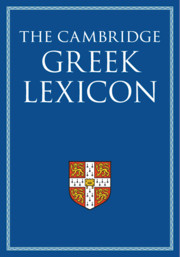118 results
THE HISTORY OF A LEXICON - (C.) Stray, (M.) Clarke, (J.T.) Katz (edd.) Liddell and Scott. The History, Methodology, and Languages of the World's Leading Lexicon of Ancient Greek. Pp. xviii + 453, ills. Oxford: Oxford University Press, 2019. Cased, £95, US$125. ISBN: 978-0-19-881080-3.
-
- Journal:
- The Classical Review / Volume 72 / Issue 1 / April 2022
- Published online by Cambridge University Press:
- 23 December 2021, pp. 8-10
- Print publication:
- April 2022
-
- Article
- Export citation
N ν
-
- Book:
- The Cambridge Greek Lexicon
- Published online:
- 05 August 2021
- Print publication:
- 22 April 2021, pp 955-976
-
- Chapter
- Export citation
H η
-
- Book:
- The Cambridge Greek Lexicon
- Published online:
- 05 August 2021
- Print publication:
- 22 April 2021, pp 655-670
-
- Chapter
- Export citation
Structure and Content of Entries
-
- Book:
- The Cambridge Greek Lexicon
- Published online:
- 05 August 2021
- Print publication:
- 22 April 2021, pp xi-xiv
-
- Chapter
- Export citation
Title match
Φ φ
-
- Book:
- The Cambridge Greek Lexicon
- Published online:
- 05 August 2021
- Print publication:
- 22 April 2021, pp 1451-1488
-
- Chapter
- Export citation
Title match
Ξ ξ
-
- Book:
- The Cambridge Greek Lexicon
- Published online:
- 05 August 2021
- Print publication:
- 22 April 2021, pp 977-982
-
- Chapter
- Export citation

The Cambridge Greek Lexicon
-
- Published online:
- 05 August 2021
- Print publication:
- 22 April 2021
-
- Textbook
- Export citation
Title match
Ω ω
-
- Book:
- The Cambridge Greek Lexicon
- Published online:
- 05 August 2021
- Print publication:
- 22 April 2021, pp 1523-1538
-
- Chapter
- Export citation
P ρ
-
- Book:
- The Cambridge Greek Lexicon
- Published online:
- 05 August 2021
- Print publication:
- 22 April 2021, pp 1247-1256
-
- Chapter
- Export citation
Title match
Δ δ
-
- Book:
- The Cambridge Greek Lexicon
- Published online:
- 05 August 2021
- Print publication:
- 22 April 2021, pp 319-410
-
- Chapter
- Export citation
M μ
-
- Book:
- The Cambridge Greek Lexicon
- Published online:
- 05 August 2021
- Print publication:
- 22 April 2021, pp 887-954
-
- Chapter
- Export citation
o ο
-
- Book:
- The Cambridge Greek Lexicon
- Published online:
- 05 August 2021
- Print publication:
- 22 April 2021, pp 983-1046
-
- Chapter
- Export citation
Title match
Σ σ
-
- Book:
- The Cambridge Greek Lexicon
- Published online:
- 05 August 2021
- Print publication:
- 22 April 2021, pp 1257-1354
-
- Chapter
- Export citation
B
-
- Book:
- The Cambridge Greek Lexicon
- Published online:
- 05 August 2021
- Print publication:
- 22 April 2021, pp 265-296
-
- Chapter
- Export citation
Preface
-
- Book:
- The Cambridge Greek Lexicon
- Published online:
- 05 August 2021
- Print publication:
- 22 April 2021, pp vii-x
-
- Chapter
- Export citation
Title match
Ψ ψ
-
- Book:
- The Cambridge Greek Lexicon
- Published online:
- 05 August 2021
- Print publication:
- 22 April 2021, pp 1517-1522
-
- Chapter
- Export citation
Title match
Λ λ
-
- Book:
- The Cambridge Greek Lexicon
- Published online:
- 05 August 2021
- Print publication:
- 22 April 2021, pp 853-886
-
- Chapter
- Export citation
Authors and Editions
-
- Book:
- The Cambridge Greek Lexicon
- Published online:
- 05 August 2021
- Print publication:
- 22 April 2021, pp xv-xx
-
- Chapter
- Export citation
I ι
-
- Book:
- The Cambridge Greek Lexicon
- Published online:
- 05 August 2021
- Print publication:
- 22 April 2021, pp 699-722
-
- Chapter
- Export citation
Title match
Π π
-
- Book:
- The Cambridge Greek Lexicon
- Published online:
- 05 August 2021
- Print publication:
- 22 April 2021, pp 1047-1246
-
- Chapter
- Export citation

